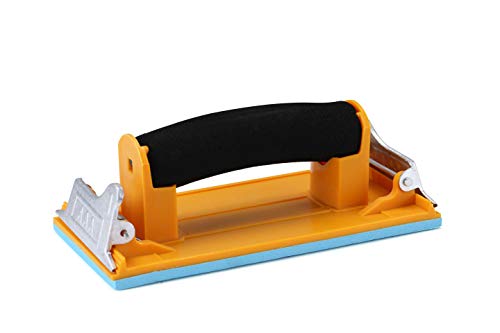Figuring out how to install your flooring can feel impossible without some help. Is this your first time working with hardwood flooring, or have you not tried glue before? We have done our research, and have the answer for you. Let's check this out.
You should glue down hardwood flooring. Solid hardwood flooring needs to be either nailed or glued down into your subfloor to stay in place. If you don't want to ruin your flooring with nails, wood-friendly glue is the perfect option. Although there are many ways to lay down hardwood, glue is best for adapting to temperature and structural changes and fluctuations.
As we begin, we will discuss how to install hardwood flooring. Whether this is a DIY home renovation or a new build, installing hardwood flooring properly will save you time and hassle later. With that said, let's get right into this post!

Why Do You Glue Hardwood Flooring?
One of the main reasons you should glue down hardwood flooring is because glue allows the wood to expand and contract without cracking. Although hardwood is very durable, your flooring needs to be able to adjust freely to avoid lifting out of place.

Generally, some of the reasons many hardwood floors crack and rise are poor prep and improper installation. Most times, floor glue is very easy to use and sets within a day.
What Glue Do You Use For Hardwood Floors?
When it comes to which type of glue to use on hardwood flooring, stick with urethane adhesive. The benefit of using urethane glue is that it has elastomeric properties, meaning your hardwood can expand and contract freely. Like we mentioned earlier, your floor's glue needs to be able to allow for movement and settling once it has dried. Another major perk of using urethane adhesive is that it is easy to clean and remove your flooring if you make a mistake.
Bostik's BEST Wood Flooring Adhesive
This adhesive is moisture-cured, scientifically formulated, does not contain water, and promises a flexible bond between your flooring.
Check this glue out on Amazon here.
How Do You Glue Down Hardwood Floors?
For those gluing down their hardwood flooring themselves, this process is relatively simple. To start:
- Make sure your subfloor is clean, smooth, and dry.
- Prep your hardwood by wiping it down and placing it where you want it on your floor.
- Tape or hold down your flooring in place before using any glue/adhesive.
- Glue down one piece of wood at a time to avoid mistakes and subfloor damage.
- Press and hold down your glued wood floor for 30 to 60 seconds.
- Allow for your newly glued hardwood flooring to set before walking/placing furniture on it.
Check out this video tutorial on properly gluing down hardwood from Floors by Southern Boys. This video covers tips and tricks to lay down your flooring and make sure the gluing process goes as smoothly as possible:
How Long Does Wood Floor Glue Take To Dry?
Typically, you can expect wood floor glue to take between 12 and 20 hours to cure fully. During this time, make sure not to frequently walk on or move any heavy items onto your wood flooring. The wood floor glue needs time to fully dry and set so your flooring will not end up shifting around. Luckily, urethane adhesive has a faster dry time at about 15 hours.

How Do I Know When My Floors Are Dry?
Although every wood floor is different, you should notice an even, hard feeling throughout your wood flooring. We recommend doing a patch test by pressing down towards the middle of your wood floor and seeing if it is fully set. To stay on the safe side, we suggest not using your newly installed floor 24 hours after using glue. Even though your glue might be dry, it can't hurt to let it sit for a bit before being used.
Weldwood Wood Floor Adhesive
This glue is a water-based synthetic adhesive and promises to allow for floor expansion and contraction.
Follow this link to see it on Amazon.
How Long Does It Take For Hardwood Glue To Dry?
Similar to regular wood, hardwood will take between 12 and 24 hours to dry fully. Hardwood flooring is thicker than standard wood, so we recommend waiting closer to the 24-hour mark. Generally, hardwood takes longer to set due to its weight, so avoid moving in furniture or hanging out on your new floors for the first day or so.
Can I Use The Same Glue-On Hardwood as Regular Wood?
Yes, you can use the same type of glue on regular and hardwood flooring. Like we previously suggested, try a urethane adhesive on either type of wood flooring for a faster dry time and better hold. The only main difference between these types of wood is the dry times and weights, so you don't need to buy different glues.
Does Tongue And Groove Flooring Need Glue?
When it comes to gluing a tongue and groove floor, this is not necessary. Tongue and groove flooring is a technique that uses similar-sized floor pieces beside one another, edge to edge, to make a single flat surface. This technique is mainly used for wood flooring and does not require glue. The reason for this is the way the wood panels are placed beside each other, locking into place like a puzzle.
Is Tongue And Groove Good For Flooring?
Although tongue and groove flooring is easy to install, we prefer a traditional glued-down method. That is not to say tongue and groove flooring is not good; it just tends to have more problems.
When it comes to gluing your floor down, tongue and groove placement doesn't do well with an adhesive like regular placement, which can cause issues down the road. Overall, if you don't plan to move around tons of heavy furniture, tongue and groove flooring is a good idea to try.
What If My Hardwood Flooring Comes Up?
If your hardwood flooring comes up, don't panic. Generally, this happens when your subfloor is not smooth enough or if your glue is not on properly. To fix this issue, remove the wood panels where they are lifted and scrape off the existing adhesive. Once you have done that, make sure to sand down your subfloor to be as smooth as possible. After this, reapply hardwood glue to your flooring and place it back where it belongs.
Aouker Hand Sander with Sponge Handle
Here we have a hand sander from Aouker to use for lifted flooring. This sander has a lightweight sponge grip, is great for sanding down subflooring and wood, and supports standard sandpaper.
See this hand sander on Amazon here.
How Long Does Glue Last On Hardwood Flooring?
Generally, your floors should stay glued down for ten to 20 years if well cared for. Although not all hardwood is the same, you can expect it to last for a while and not require much upkeep. The key to a long-lasting floor is a good foundation and prepping, so spend some extra time on your base/subfloor. Choosing a good, sturdy glue is also very important for hardwood flooring and needs to be breathable and adapt well to pressure changes.
Henry, WW Company Floor Adhesive
Here is a long-lasting floor adhesive from Henry WW to use while installing hardwood flooring. This product is made in the US, formulated for hardwood flooring, and promises outstanding rebound characteristics.
Check this floor glue out on Amazon here.
The Wrap Up
Whether you install hardwood flooring regularly or want to start a project, glue is essential. Urethane glue is one of the better options for hardwood flooring and lasts ten to 20 years. Another thing to remember is that whatever glue you use, make sure to give it plenty of time to set and fully dry. When it comes to tongue and groove flooring, we suggest you stick with a traditional glue option if you have heavy traffic/furniture. Regardless of what expertise level you are at, make sure to sand down your subfloor and let your glue dry.
Before you go, be sure to check out these awesome related posts!




